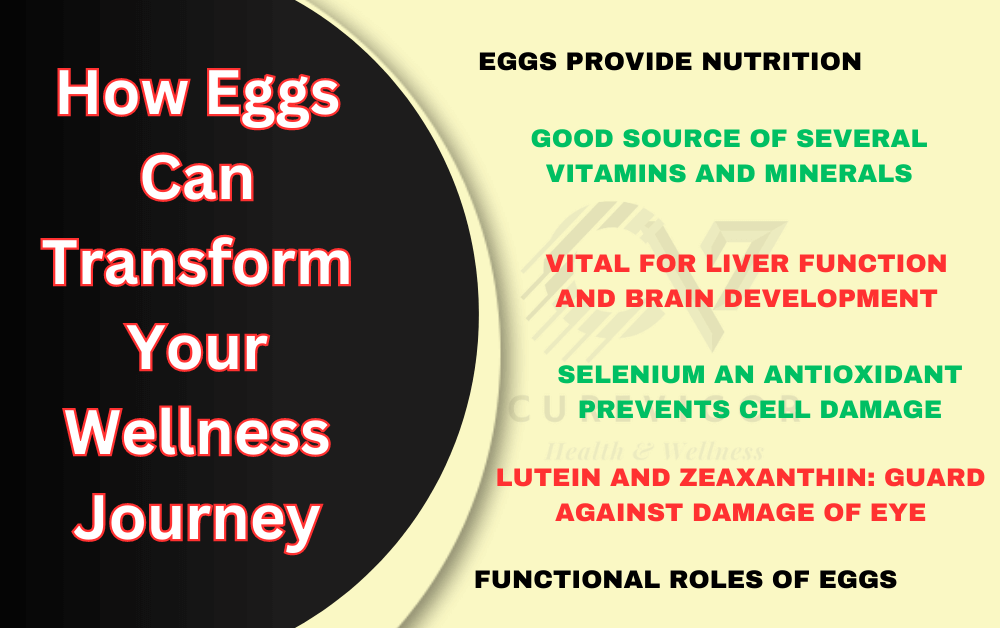Unlock the power of eggs to enhance your wellness journey! Learn how incorporating eggs into your diet can yield numerous health benefits, from improved muscle strength to better brain function. Dive into this comprehensive guide and discover the secrets to a healthier lifestyle today!
Contents
How Eggs Can Transform Your Wellness Journey!
Embark on a journey to better health and vitality with a simple yet powerful ingredient: eggs. These humble, versatile orbs of nutrition have been a staple in diets worldwide for centuries, and for good reason. Packed with essential nutrients and boasting an impressive array of health benefits, eggs have the potential to transform your wellness journey in ways you may not have imagined. From boosting muscle strength to enhancing brain function, the possibilities are endless. Join us as we explore how eggs can contribute to a healthier, happier you.
1. The Nutritional Powerhouse
Eggs are among the most nutritious foods available, and their nutritional profile is worth exploring in detail. Eggs are an excellent source of high-quality protein, containing all nine essential amino acids our bodies need to function correctly. They provide a complete source of protein necessary for muscle repair and growth.
In addition to protein, eggs are rich in various vitamins and minerals that our bodies need to stay healthy. For example, eggs are one of the few food sources of vitamin D essential for strong bones and teeth. They are also high in vitamin B12, which is necessary for maintaining healthy nerve cells and producing red blood cells.
Eggs are also a good source of selenium, a vital mineral in various bodily functions, including thyroid and immune system health. Other essential nutrients found in eggs include choline, which is critical for brain health, and lutein and zeaxanthin, which are crucial for eye health.
Overall, eggs are a nutrient-dense food that can provide a wide range of health benefits when consumed as part of a balanced diet.
2. Muscle Strength and Recovery
Eggs are a great source of high-quality protein that can benefit people looking to build solid muscles and recover faster after a workout. The protein in eggs contains all the essential amino acids our body requires to maintain and repair muscle tissue. As a result, eggs are considered a complete protein source, making them an ideal food for those who engage in regular exercise or strength training.
Protein plays a vital role in maintaining lean muscle mass in our body, which is why it is essential to have an adequate protein intake. When we engage in physical activity, our muscles undergo wear and tear, and protein helps repair and rebuild those muscles. If we do not consume enough protein, our muscles may not recover correctly, leading to muscle loss and reduced strength.
Eggs are particularly useful in promoting muscle repair, reducing muscle soreness, and improving recovery. They are rich in leucine, an essential amino acid that helps in stimulating muscle protein synthesis. Additionally, eggs contain vitamins and minerals such as vitamin D, calcium, and phosphorus, which are crucial for maintaining bone health and muscle function.
Including eggs in your diet can be an excellent way to increase your protein intake and promote muscle health. If you engage in regular exercise or strength training, eggs can help you achieve your fitness goals faster by supporting muscle growth, reducing muscle soreness, and improving recovery time.
3. Brain Health and Cognitive Function
Eggs are a powerhouse of nutrients that can positively impact brain health and cognitive function. The two essential nutrients found in eggs that play a crucial role in this regard are choline and omega-3 fatty acids.
Choline is an essential nutrient that is abundantly present in eggs. It is a precursor to acetylcholine, a vital neurotransmitter for memory and overall cognitive function. Choline also plays a critical role in the development of the brain, especially during fetal development and infancy. Consuming adequate amounts of choline can reduce the risk of cognitive decline in later life.
Omega-3 fatty acids, which are also found in eggs, have been shown to have numerous benefits for the brain. They are essential for the structural integrity of brain cells and can improve cognitive function, memory, and concentration. Omega-3 fatty acids are also anti-inflammatory, positively impacting brain health and reducing the risk of neurodegenerative diseases.
Eggs are a great source of choline and omega-3 fatty acids, essential for brain health and cognitive function. Consuming eggs regularly can improve memory, concentration, and overall cognitive performance while reducing the risk of cognitive decline and neurodegenerative diseases.
4. Weight Management and Satiety
Incorporating eggs into your diet can be a helpful strategy if you want to manage your weight. Numerous studies have demonstrated that consuming eggs for breakfast can cause feelings of fullness and reduce overall calorie intake throughout the day. Eggs increase satiety and regulate appetite due to their high protein and fat content. The protein in eggs is of high quality. It contains all the essential amino acids the body needs to build and maintain muscles, making it an excellent food for weight management.
Moreover, eggs are a nutrient-rich food that can provide a variety of essential vitamins and minerals, including vitamin D, choline, and selenium. Vitamin D is necessary for bone health, while choline is crucial in brain function and liver health. Selenium, on the other hand, is a powerful antioxidant that helps protect the body against cell damage and reduces the risk of chronic disease.
Including eggs in your diet can also help with weight loss, as they are low in calories, especially compared to other protein sources like meat. One large egg contains only about 78 calories, making it an ideal food for calorie-conscious individuals.
Individuals can achieve weight management goals by adding eggs to a balanced diet while enjoying a tasty and satisfying meal. Eggs are versatile food that can be prepared in many ways, making them a great addition to any meal.
5. Versatility in the Kitchen
Eggs are a staple ingredient in the culinary world, enjoyed worldwide for their taste and nutritional value. They are incredibly versatile, as they can be cooked in various ways and used in multiple dishes. From classic breakfast dishes like scrambled eggs and omelets to gourmet creations like Eggs Benedict and soufflés, there is no limit to what can be created.
There are many cooking methods for eggs, each offering a unique texture and flavor.
- Boiling eggs is a popular method used to make hard-boiled eggs, which can be eaten on their own or used in salads and sandwiches.
- Fried eggs, cooked sunny-side up, over-easy, or over-hard, are a popular breakfast dish that can be enjoyed with toast and bacon.
- Poaching eggs is another popular method used to make dishes like Eggs Benedict while scrambling eggs can be used to make fluffy omelets and breakfast burritos.
In addition to traditional dishes, there are also innovative recipes featuring eggs as the star ingredient that can inspire your creativity in the kitchen. Nutrient-packed omelets can be loaded with vegetables and cheese for a healthy breakfast, while indulgent desserts like custards and meringues can be made with egg yolks and whites. With so many options, eggs are a versatile and delicious ingredient to experiment with in the kitchen.
Conclusion
Incorporating eggs into your diet is more than just a culinary choice—it’s a step towards a healthier, more vibrant lifestyle. With their unmatched nutritional profile and diverse range of health benefits, eggs have the power to support muscle strength, enhance brain function, aid in weight management, and elevate your overall well-being. Whether enjoyed at breakfast, lunch, or dinner, eggs offer endless possibilities for nourishing and satisfying meals. So why wait? Join the egg revolution today and discover the transformative effects they can have on your wellness journey!
FAQs
Q. How can eggs help your body to be healthy?
Eggs can contribute to overall health in numerous ways. They are rich in high-quality protein, essential vitamins, and minerals, crucial for various bodily functions. Protein in eggs supports muscle strength and repair, while nutrients like choline and omega-3 fatty acids promote brain health and cognitive function. Additionally, eggs can aid in weight management by promoting feelings of fullness and reducing calorie intake. Incorporating eggs into your diet can provide various health benefits, supporting a healthy, vibrant body.
Q. What impact do eggs have on your health?
Eggs have a significant impact on health due to their nutrient-rich composition. They provide essential nutrients such as protein, vitamins (including vitamin D and B12), minerals (such as selenium), and antioxidants. These nutrients support muscle strength, brain function, weight management, and well-being. Regular consumption of eggs has been linked to improved muscle mass, enhanced cognitive performance, and reduced risk factors for chronic diseases. Including eggs in your diet can improve health outcomes and quality of life.
Q. What are egg implications for fitness and well-being?
Eggs have positive implications for fitness and well-being due to their nutritional profile and versatility. As a rich source of protein, eggs support muscle strength, repair, and recovery, making them valuable for individuals engaged in fitness and exercise. Additionally, nutrients like choline and omega-3 fatty acids promote brain health, while the satiating properties of eggs can aid in weight management. By incorporating eggs into a balanced diet, individuals can optimize their fitness goals, enhance overall well-being, and enjoy delicious, nutritious meals.
Q. How might you use eggs to plan a healthy meal?
Eggs can be utilized in various ways to plan healthy, balanced meals. Consider preparing a vegetable-packed omelet or protein-rich scramble with whole-grain toast for breakfast. Add hard-boiled eggs into salads or sandwiches for a protein boost for lunch or dinner. Additionally, eggs can serve as a versatile ingredient in soups, stir-fries, and casseroles, adding flavor and nutritional value to meals. Combining eggs with vegetables, whole grains, and lean proteins can create satisfying, nutrient-dense meals to support your health and well-being.
Q. What are the five benefits of eating eggs?
- It is a rich source of high-quality protein for muscle strength and repair.
- It contains essential vitamins and minerals, including vitamin D, B12, and selenium, supporting overall health.
- It promotes brain health and cognitive function due to the presence of nutrients like choline and omega-3 fatty acids.
- It aids in weight management by increasing feelings of fullness and reducing calorie intake.
- A versatile ingredient that can be incorporated into a wide range of healthy meals, providing both nutrition and flavor.
Q. Why is the egg significant in our life?
Eggs are essential in our lives due to their exceptional nutritional value and versatility. They are a complete protein source, providing all nine essential amino acids for optimal health. Eggs contain essential vitamins, minerals, and antioxidants that support various bodily functions, including muscle growth, brain function, and immune health. Additionally, eggs are affordable, widely available, and easy to prepare, making them a convenient and accessible food choice for individuals and families worldwide. Incorporating eggs into our diet can improve health outcomes, enhancing and creating satisfying meals.
Read more articles about Health and Wellness.










